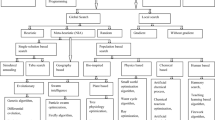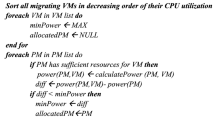Abstract
Optimizing task scheduling in a distributed heterogeneous computing environment, which is a nonlinear multi-objective NP-hard problem, plays a critical role in decreasing service response time and cost, and boosting Quality of Service (QoS). This paper, considers four conflicting objectives, namely minimizing task transfer time, task execution cost, power consumption, and task queue length, to develop a comprehensive multi-objective optimization model for task scheduling. This model reduces costs from both the customer and provider perspectives by considering execution and power cost. We evaluate our model by applying two multi-objective evolutionary algorithms, namely Multi-Objective Particle Swarm Optimization (MOPSO) and Multi-Objective Genetic Algorithm (MOGA). To implement the proposed model, we extend the Cloudsim toolkit by using MOPSO and MOGA as its task scheduling algorithms which determine the optimal task arrangement among VMs. The simulation results show that the proposed multi-objective model finds optimal trade-off solutions amongst the four conflicting objectives, which significantly reduces the job response time and makespan. This model not only increases QoS but also decreases the cost to providers. From our experimentation results, we find that MOPSO is a faster and more accurate evolutionary algorithm than MOGA for solving such problems.





Similar content being viewed by others
References
Alves, M.J.: Using MOPSO to solve multiobjective bilevel linear problems. Springer, Heidelberg (2012)
Buyya, R., Beloglazov, A., Abawajy, J.: Energy-efficient management of data center resources for cloud computing: A vision, architectural elements, and open challenges. arXiv preprint arXiv:1006.0308 (2010)
Calheiros, R.N., Ranjan, R., De Rose, C.A.F., Buyya, R.: Cloudsim: A novel framework for modeling and simulation of cloud computing infrastructures and services. Arxiv preprint arXiv:0903.2525 (2009)
Cirne, W., et al.: Labs of the world, unite!!! J. Grid Comput. 4(3), 225–246 (2006)
Deb, K., Pratap, A., Agarwal, S., Meyarivan, T.: A fast and elitist multiobjective genetic algorithm: NSGA-II. IEEE Trans. Evol. Comput. 6(2), 182–197 (2002)
Gao, Y., Zhang, G., Lu, J., Wee, H.-M.: Particle swarm optimization for bi-level pricing problems in supply chains. J. Glob. Optim. 51(2), 245–254 (2011)
Guo, L., Zhao, S., Shen, S., Jiang, C.: Task scheduling optimization in cloud computing based on heuristic algorithm. J. Netw. 7(3), 547–553 (2012)
Hadka, D.: MOEA Framework A Free and Open Source Java Framework for Multiobjective Optimization, [Online], Available: http://www.moeaframework.org/
Juhnke, E., Dörnemann, T., Böck, D., Freisleben, B.: Multi-objective scheduling of BPEL workflows in geographically distributed clouds. In: 4th IEEE International Conference on Cloud Computing, pp. 412–419 (2011)
Lei, Z., Yuehui, C., Runyuan, S., Shan, J., Bo, Y.: A task scheduling algorithm based on PSO for grid computing. Int. J. Comput. Intell. Res. 4(1), 37–43 (2008)
Li, J., Peng, J., Cao, X., Li, H.-y.: A task scheduling algorithm based on improved ant colony optimization in cloud computing environment. Energy Procedia 13, 6833–6840 (2011)
Li, J., Qiu, M., Ming, Z., Quan, G., Qin, X., Gu, Z.: Online optimization for scheduling preemptable tasks on IaaS cloud systems. J. Parallel Distrib. Comput. 72(5), 666–677 (2012)
Liu, H., Abraham, A., Snášel, V., McLoone, S.: Swarm scheduling approaches for work-flow applications with security constraints in distributed data-intensive computing environments. Inf. Sci. 192, 228–243 (2012)
Lu, J., Zhang, G., Ruan, D.: Multi-objective group decision making: methods, software and applications with fuzzy set techniques. Imperial College Press, London (2007)
Mahabadi, A., Zahedi, S.M., Khonsari, A.: Reliable energy-aware application mapping and voltage–frequency island partitioning for GALS-based NoC. J. Comput. Syst. Sci. 79(4), 457–474 (2013)
Mahmoodabadi, M.J., Bagheri, A., Nariman-zadeh, N., Jamali, A.: A new optimization algorithm based on a combination of particle swarm optimization, convergence and divergence operators for single-objective and multi-objective problems. Eng. Optim. 44(10), 1–20 (2012)
Priya, B., Pilli, E.S., Joshi, R.C.: A survey on energy and power consumption models for Greener Cloud. In: Advance Computing Conference (IACC), 2013 I.E. 3rd International, 2013, IEEE, pp. 76–82
Ramezani, F., Lu, J., Hussain, F.K.: Task-based system load balancing in cloud computing using particle swarm optimization. Int. J. Parallel Prog. 42(5), 739–754 (2013)
Ramezani, F., Lu, J., Hussain, F.: Task scheduling optimization in cloud computing applying multi-objective particle swarm optimization. International Conference on Service Oriented Computing (ICSOC), pp. 237–251 (2013)
Rizvandi, N.B., Taheri, J., Zomaya, A.Y.: Some observations on optimal frequency selection in DVFS-based energy consumption minimization. J. Parallel Distrib. Comput. 71(8), 1154–1164 (2011)
Salman, A., Ahmad, I., Al-Madani, S.: Particle swarm optimization for task assignment problem. Microprocess. Microsyst. 26(8), 363–371 (2002)
Shieh, W.-Y., Pong, C.-C.: Energy and transition-aware runtime task scheduling for multicore processors. J. Parallel Distrib. Comput. 73(9), 1225–1238 (2013)
Song, B., Hassan, M.M., Huh, E.: A novel heuristic-based task selection and allocation framework in dynamic collaborative cloud service platform. In: 2nd IEEE International Conference on Cloud Computing Technology and Science (CloudCom), pp. 360–367 (2010)
Srinivas, N., Deb, K.: Muiltiobjective optimization using nondominated sorting in genetic algorithms. Evol. Comput. 2(3), 221–248 (1994)
Su, S., Li, J., Huang, Q., Huang, X., Shuang, K., Wang, J.: Cost-efficient task scheduling for executing large programs in the cloud. Parallel Comput. 39(4–5), 177–188 (2013)
Taheri, J., Zomaya, A.Y., Bouvry, P., Khan, S.U.: Hopfield neural network for simultaneous job scheduling and data replication in grids. Futur. Gener. Comput. Syst. 29, 1885–1900 (2013)
Taheri, J., Zomaya, A.Y., Siegel, H.J., Tari, Z.: Pareto frontier for job execution and data transfer time in hybrid clouds. Futur. Gener. Comput. Syst. 37, 321–334 (2014)
Tayal, S.: Tasks scheduling optimization for the cloud computing systems. Int. J. Adv. Eng. Sci. Technol. 5(2), 111–115 (2011)
Tchernykh, A., Pecero, J.E., Barrondo, A., Schaeffer, E.: Adaptive energy efficient scheduling in Peer-to-Peer desktop grids. Futur. Gener. Comput. Syst. 36, 209–220 (2014)
Top 500 Supercomputing Sited, [Online], Available: http://www.top500.org/system/176223
Wang, X., Wang, Y., Cui, Y.: A new multi-objective bi-level programming model for energy and locality aware multi-job scheduling in cloud computing. Futur. Gener. Comput. Syst. 36, 91–101 (2014)
Wang, L., et al.: Energy-aware parallel task scheduling in a cluster. Futur. Gener. Comput. Syst. 29(7), 1661–1670 (2013)
Zhang, Y.-w., Guo, R.-f.: Power-aware scheduling algorithms for sporadic tasks in real-time systems. J. Syst. Softw. 86(10), 2611–2619 (2013)
Zhang, Y., Lu, C., Zhang, H., Han, J.: Active vibration isolation system integrated optimization based on multi-objective genetic algorithm. In: IEEE 2nd International Conference on Computing, Control and Industrial Engineering (CCIE), pp. 258–261 (2011)
Acknowledgments
The work presented in this paper was supported by the Australian Research Council (ARC) under Discovery Project DP140101366. The Authors also would like to thank Mr Chaosong Nie for his kind help in implementing the MOGA algorithm.
Author information
Authors and Affiliations
Corresponding author
Rights and permissions
About this article
Cite this article
Ramezani, F., Lu, J., Taheri, J. et al. Evolutionary algorithm-based multi-objective task scheduling optimization model in cloud environments. World Wide Web 18, 1737–1757 (2015). https://doi.org/10.1007/s11280-015-0335-3
Received:
Revised:
Accepted:
Published:
Issue Date:
DOI: https://doi.org/10.1007/s11280-015-0335-3




